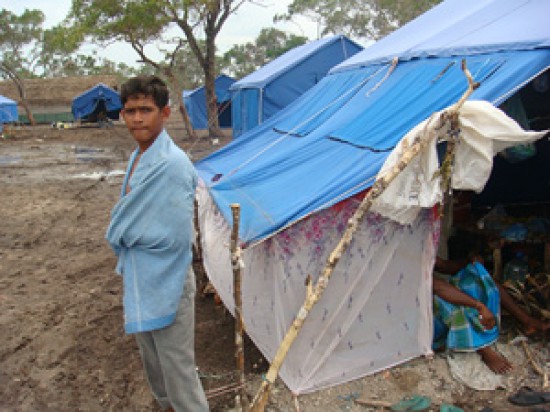Sri Lanka’s infamous Menik farm IDP camp to shut down later this month
SEPTEMBER 21, 2012: Menik Farm in northern Sri Lanka, once one of the world’s largest camps for internally displaced persons (IDPs), is to close by the end of September, say government officials.
“By 30 September the camp will be empty,” Minister of Resettlement Gunaratne Weerakoon told
IRIN in Colombo, noting that the final group of 1,185 IDPs would be resettled in their places of origin next week.
According to the UN Refugee Agency (UNHCR), 827 IDPs are set to return on either 23 or 24 September, mostly to the town of Puthukkudiyiruppu in Mullaitivu District, northern Sri Lanka. The destination of the final balance of 358 has yet to be determined.
The camp – a sprawling 700-hectare site outside the northern town of Vavuniya – was hastily erected in the final stages of the decades-long war between government forces and now defeated Liberation Tigers of Tamil Eelam (LTTE), who had been fighting for an independent Tamil homeland since 1983.
At its height at the end of the war, nearly 300,000 IDPs lived in the camp.
Landmines
“The camp closure has taken three years due to multiple reasons,” Weerakoon explained. “Demining is still in progress in the Mullativu District and some areas are not declared safe yet. Besides, material for home reconstruction has to be provided as many homes are nothing more than rubble and not habitable.”
The UN Development Programme’s (UNDP) Mine Action Project reports some 112sqkm of land remains contaminated across 10 districts, including 25sqkm in Mullaitivu.
The temporary shelters that collectively formed Menik Farm are currently being dismantled as the final batch of people prepare to leave, said Vavuniya Government Agent Bandula Harischandra, the most senior government official in the area.
“We are clearing the entire camp area. The site area too will be available for public purposes,” Harischandra said. Several schools and hospitals which were located within Menik Farm will remain.
“There were no permanent structures. We are clearing the entire camp area. The site area too will be available for public purposes,” Harischandra said. There were, however, several schools and hospitals which were also located within Menik Farm.
For the remaining few hundred families still in Menik Farm, plans – including special resettlement packages for returnees – are in place to assist people to their home areas within the next few days, the government says.
“The government, with the assistance of humanitarian aid groups, provides roofing sheets and other required building material together with Rs 25,000 [US$190]. Dry food items for up to nine months are provided at the time of resettlement, while for a week, cooked food will be provided,” said Resettlement Authority Chairman B. H. Passaperum.
There are multiple livelihood support schemes managed by the Resettlement Ministry to assist the IDPs, Weerakoon said, pointing out however, that resettlement was “not easy”. He cited seven key areas the government is focusing on: water and sanitation, road access to IDP villages, electricity, education, community development initiatives, fishing, and agriculture and livelihood support.
“This means, once resettled, we will continue to work with them towards their welfare,” he said.
Mixed emotions
Meanwhile, for residents in the camp, there is both hope and apprehension over the camp’s closure.
“I’m excited at the prospect of finally returning home, but I’m also worried. I know there is nothing to return to,” said camp resident Ilangithirayan Saumyamurthy from Jaffna District. “Starting all over again – even with assistance – won’t be easy,” the 41-year-old added, a sentiment echoed by others.
“I ploughed the fields with my husband. My husband was killed. I have kids to raise and a home to build over again,” said Senthilvelu Kamayani, 32, from Mullaitivu District.
There was more work to be done in her district before it can be declared mine-free, said a worker from Mine Action, who asked not to be identified.
Courtesy IRIN

